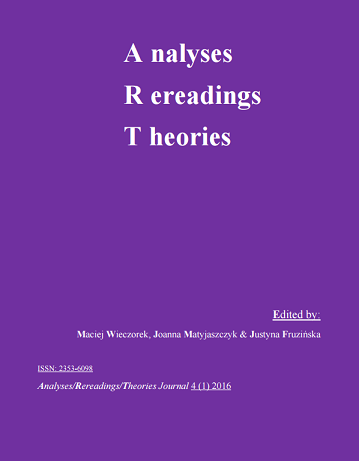The Narrator’s Identity and the Pursuit of Trespassing Boundaries in Mary Shelley’s Frankenstein
DOI:
https://doi.org/10.18778/2353-6098.4.02Keywords:
identity, narrator, trespassing of boundaries, Frankenstein, Mary ShelleyAbstract
The article focuses on the problem of the narrator’s and the author’s identity in Mary Shelley’s Frankenstein. According to Charles Taylor’s philosophy of subjectivity in order to have an identity we have to know what kind of good we would like to fulfil in our life. Such an orientation to the good (an orientation in moral space) and an endeavour after realizing this main value defines us as ourselves. In the paper it is argued that the pursuit of trespassing boundaries is constitutive to the narrator’s identity in the novel as it is such kind of an aim without which they could not have been themselves. It is also the key to the author’s identity. Through the medium of the stories of her male story-tellers she confronts her own demons, explores the territories of the subconscious beyond the bounds of understanding and depicts her struggle with the limitations she overcame as a woman in a patriarchal society and as a person who invented a new literary genre – science-fiction literature.
References
Baldick, Chris. In Frankenstein’s Shadow. Myth, Monstrosity, and Nineteenth-Century Writing. Oxford: Clarendon P, 1996. Print.
Google Scholar
Benford, Criscillia. "'Listen to my tale': Multilevel Structure, Narrative Sense Making, and the Inassimilable in Mary Shelley‘s Frankenstein." Narrative 3 (2010): 324-46. Print.
Google Scholar
DOI: https://doi.org/10.1353/nar.2010.0000
Britton, Jeanne M. “Novelistic Sympathy in Mary Shelley‘s Frankenstein.” Studies in Romanticism 1 (2009): 3-23. Print.
Google Scholar
Brown, Marshall. “A Philosophical View of the Gothic Novel.” Studies in Romanticism 2 (1987): 275-301. Print.
Google Scholar
DOI: https://doi.org/10.2307/25600652
Burke, Edmund. A Philosophical Enquiry into the Origin of our Ideas of the Sublime and Beautiful. London: Routledge and Kegan Paul, 1958. Print.
Google Scholar
DOI: https://doi.org/10.7312/burk90112
Herman, David, Manfred Jahn, and Marie-Louise Ryan, eds. Routledge Encyclopedia of Narrative Theory. London: Routledge, 2010. Print.
Google Scholar
DOI: https://doi.org/10.4324/9780203932896
Kant, Immanuel. Critique of Pure Reason. Trans. J.M.D. Meiklejohn. London: J.M. Dent&Sons, 1950. Print.
Google Scholar
Mellor, Anne K. Mary Shelley. Her Life, Her Fiction, Her Monsters. New York: Routledge, 1988. Print.
Google Scholar
Randel, Fred V. “Frankenstein, Feminism, and the Intertextuality of Mountains.” Studies in Romanticism 4 (1984): 515-32. Print.
Google Scholar
DOI: https://doi.org/10.2307/25600514
Rubenstein, Marc A. “‘My Accursed Origin’: The Search for the Mother in Frankenstein.’” Studies in Romanticism 2 (1976): 165-94. Print.
Google Scholar
DOI: https://doi.org/10.2307/25600007
Taylor, Charles. Sources of the Self. The Making of the Modern Identity. Cambridge: Cambridge UP, 1992. Print.
Google Scholar
Shelley, Mary. Frankenstein or the Modern Prometheus. Ware: Wordsworth Editions, 1999. Print.
Google Scholar
Downloads
Published
How to Cite
Issue
Section
License

This work is licensed under a Creative Commons Attribution-NonCommercial-NoDerivatives 3.0 Unported License.









